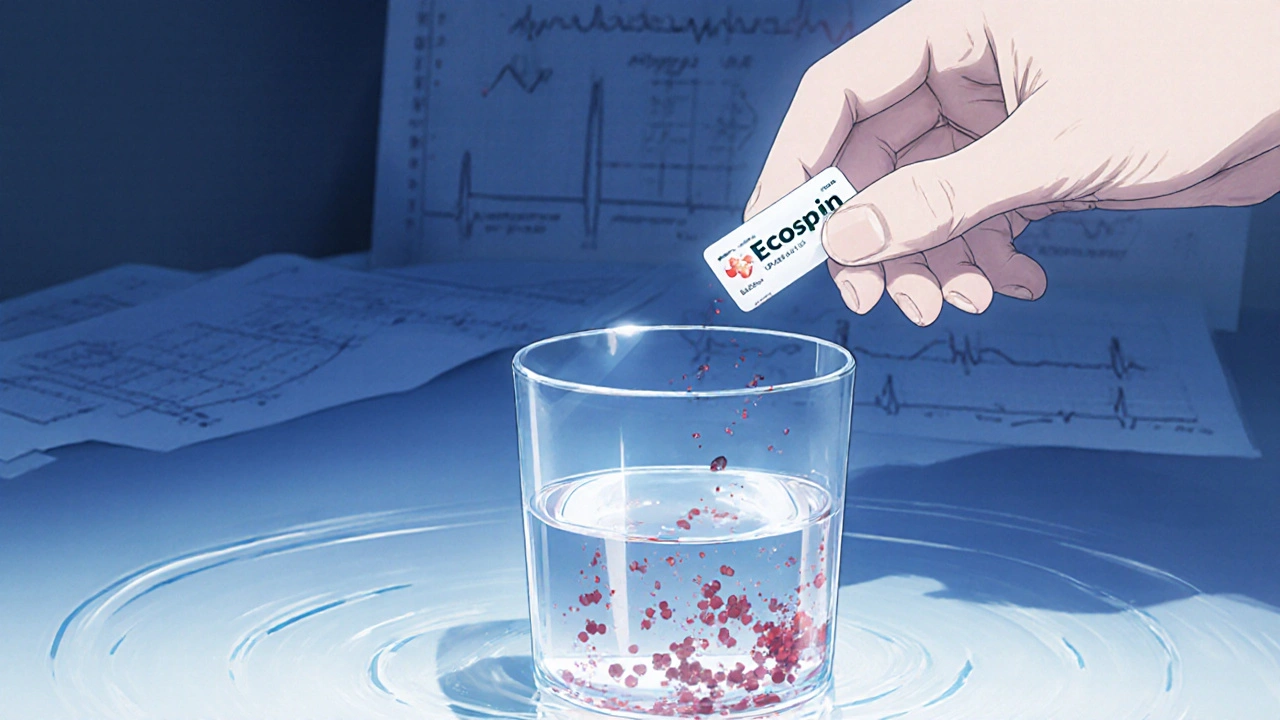
Aspirin Alternative Comparison Tool
This tool helps you understand which blood thinner might be most appropriate for your specific health situation based on NHS guidelines and clinical evidence. The data is based on the article "Compare Ecosprin (Aspirin) with Alternatives: What Works Best for You?".
Your Situation
Key Comparison Metrics
Ecosprin is a brand name for low-dose aspirin, commonly prescribed in the UK and other countries to reduce the risk of heart attacks and strokes. It’s not a new drug - aspirin has been around since the 1890s - but many people still don’t know how it compares to other options. If you’ve been told to take Ecosprin daily, you might be wondering: are there better choices? Is it still the gold standard? Or could something else work just as well with fewer side effects?
What Ecosprin Actually Does
Ecosprin contains acetylsalicylic acid, the same active ingredient as regular aspirin. At low doses (usually 75-100 mg per day), it works by stopping platelets - tiny blood cells - from sticking together and forming clots. That’s why it’s used for people who’ve had a heart attack, stroke, or have blocked arteries. It doesn’t cure anything. It doesn’t lower cholesterol. It just makes your blood a little less likely to clot.
In the UK, the NHS recommends low-dose aspirin only for people with a high risk of cardiovascular events - not for healthy adults over 70, because the risk of internal bleeding often outweighs the benefit. That’s important. You don’t take it because you’re worried about your heart. You take it because your doctor calculated your risk and decided the math works in your favour.
How Ecosprin Compares to Clopidogrel (Plavix)
Clopidogrel, sold as Plavix, is the most common alternative to Ecosprin. It works differently. Instead of blocking the COX-1 enzyme like aspirin, it targets a receptor on platelets called P2Y12. This means it stops platelets from clumping in a different way.
Studies like the CAPRIE trial show clopidogrel is slightly more effective than aspirin at preventing strokes and heart attacks - about 8.7% fewer events over three years. But the difference is small. For most people, it’s not enough to justify switching.
Here’s the real difference: side effects.
Aspirin can irritate your stomach. Up to 1 in 10 people get indigestion, ulcers, or even bleeding. Clopidogrel is gentler on the stomach - which is why it’s often used if you can’t tolerate aspirin. But it’s more expensive. And it doesn’t help with headaches or inflammation like aspirin does. If you’re taking it just for heart protection, that doesn’t matter. But if you’re using it for pain too, aspirin might be the better fit.
What About Ticagrelor (Brilinta)?
Ticagrelor, sold as Brilinta, is stronger than both aspirin and clopidogrel. It’s usually prescribed after a heart attack or stent placement, often alongside low-dose aspirin. It works faster and reversibly - meaning if you stop taking it, your blood returns to normal quicker.
But here’s the catch: ticagrelor increases your risk of serious bleeding and causes shortness of breath in about 15% of users. That’s not a minor side effect. It’s something you notice every day. It’s also significantly more expensive. For most people on long-term prevention, it’s overkill.
Doctors usually reserve ticagrelor for high-risk patients - those with recent heart attacks, diabetes, or multiple blocked arteries. If you’re just trying to prevent your first heart attack, it’s not the right tool.
Prasugrel (Effient): A Stronger Clopidogrel?
Prasugrel is another platelet blocker, similar to clopidogrel but faster and more potent. It’s used mostly after stent placement, especially in people with diabetes or those who had a heart attack. Like ticagrelor, it’s not meant for long-term, everyday use in low-risk patients.
Studies show it prevents more clots than clopidogrel - but also causes more bleeding. In fact, the FDA warns against using it in people over 75, under 60 kg, or with a history of stroke. That’s a lot of restrictions. For most people taking aspirin for prevention, prasugrel isn’t even an option.

Can You Use NSAIDs Instead? Like Ibuprofen or Naproxen?
No. And here’s why this matters.
Many people think, “If aspirin helps with pain and inflammation, maybe ibuprofen or naproxen will do the same for my heart.” They’re wrong. NSAIDs like ibuprofen don’t block platelets the same way. In fact, they can interfere with aspirin’s effect. If you take ibuprofen within a few hours of your aspirin, it can block aspirin from binding to platelets - making your heart protection useless.
Naproxen is a little safer in this regard, but it still doesn’t offer the same level of protection. And long-term use of any NSAID raises your risk of stomach bleeding, kidney damage, and high blood pressure. If you need pain relief while on aspirin, paracetamol is the only safe choice.
What About Natural Alternatives? Fish Oil, Garlic, Turmeric?
People ask this all the time. “Can I just take fish oil instead?”
Omega-3 fatty acids from fish oil do have mild blood-thinning effects. But the evidence is weak. A 2019 study in the New England Journal of Medicine found no significant reduction in heart attacks or strokes among people taking high-dose fish oil compared to placebo. It didn’t replace aspirin.
Garlic and turmeric have even less proof. Some small studies show slight effects on platelet activity, but nothing consistent or strong enough to rely on. And unlike aspirin, these aren’t regulated. You don’t know how much active ingredient you’re getting. One bottle might be strong. Another might be useless.
If you’re thinking of replacing Ecosprin with supplements, talk to your doctor first. You might be trading a proven, low-cost medication for something that doesn’t work - and possibly causes interactions.
Who Should Switch from Ecosprin?
You don’t need to switch just because you heard something online. But there are real reasons to consider alternatives:
- You’ve had a stomach ulcer or bleeding from aspirin
- You’re allergic to aspirin (rare, but possible)
- You’ve had a stent or recent heart attack and need stronger protection
- Your doctor says your risk is high enough to need something stronger than aspirin
If none of those apply, sticking with Ecosprin is still the safest, cheapest, and most studied option. It’s been used by millions for decades. The data is solid.

Cost, Availability, and NHS Guidelines
In the UK, generic aspirin (75 mg) costs less than £2 for a 100-tablet pack. Ecosprin, the branded version, costs more - often double. But there’s no difference in the active ingredient. Your pharmacist can give you the generic version if you ask.
The NHS guidelines are clear: aspirin is recommended only for people with established cardiovascular disease. It’s not for healthy people over 70. If you’re taking it “just in case,” your doctor should have reviewed that decision recently.
And if you’re on a blood thinner like warfarin or DOACs (apixaban, rivaroxaban), don’t add aspirin without medical advice. Combining them increases bleeding risk dramatically.
What Happens If You Stop Ecosprin Suddenly?
Don’t just quit. Stopping low-dose aspirin suddenly can cause a rebound effect - your platelets become hyperactive. Studies show this can increase the risk of heart attack or stroke in the weeks after stopping.
If you need to stop - maybe because of surgery or bleeding - your doctor will tell you how to do it safely. Sometimes they’ll replace it with another medication first. Sometimes they’ll have you stop gradually. Never stop on your own.
Bottom Line: Ecosprin Still Holds Up
For most people who need daily blood thinning for heart protection, Ecosprin (aspirin) remains the best choice. It’s cheap, well-studied, and effective. Alternatives like clopidogrel or ticagrelor have their place - but only for specific, higher-risk cases.
Don’t switch just because something sounds newer or stronger. The goal isn’t to find the most powerful drug. It’s to find the one that works for you - with the least risk and the most reliability.
If you’re unsure whether you should be taking it - or whether you should switch - talk to your GP or cardiologist. Bring your current meds. Ask: “Is this still right for me?” That’s the best advice you can get.
Is Ecosprin the same as aspirin?
Yes. Ecosprin is a branded version of low-dose aspirin (acetylsalicylic acid). The active ingredient is identical. Generic aspirin is just as effective and usually cheaper. The only differences are in fillers, coating, or packaging - not how it works in your body.
Can I take Ecosprin with other painkillers?
Avoid ibuprofen and naproxen. They can block aspirin’s effect on platelets. Paracetamol (acetaminophen) is safe to take with Ecosprin for pain or fever. Always check with your pharmacist before mixing medicines.
What are the biggest risks of taking Ecosprin daily?
The main risk is internal bleeding - especially in the stomach or brain. About 1 in 10 people develop stomach irritation. Serious bleeding happens in about 1 in 1,000 people per year. That risk increases with age, alcohol use, or if you’re also taking steroids or anticoagulants.
Should I take Ecosprin if I’m over 70?
The NHS no longer recommends daily aspirin for healthy adults over 70. The risk of bleeding often outweighs the benefit. If you’ve already had a heart attack or stroke, your doctor may still recommend it. But if you’re taking it just to prevent one, talk to your GP - it’s likely no longer appropriate.
Is there a natural substitute for Ecosprin?
No reliable natural substitute exists. Fish oil, garlic, turmeric, and ginger have mild effects on blood flow, but none have been proven to prevent heart attacks or strokes like aspirin does. Supplements aren’t regulated, so you can’t be sure of the dose or quality. Don’t replace prescribed medication with them.
What should I do if I miss a dose of Ecosprin?
If you miss one dose, take it as soon as you remember - unless it’s almost time for your next one. Don’t double up. Missing one day won’t undo your protection. But don’t make it a habit. Consistency matters more than perfection.

Katherine Reinarz
October 31, 2025 AT 03:17shivam mishra
November 1, 2025 AT 07:46Aditya Singh
November 2, 2025 AT 06:25Callum Breden
November 2, 2025 AT 08:30Mansi Gupta
November 3, 2025 AT 14:00Erin Corcoran
November 5, 2025 AT 13:23krishna raut
November 6, 2025 AT 05:32Prakash pawar
November 7, 2025 AT 11:34MOLLY SURNO
November 7, 2025 AT 20:47John Kane
November 9, 2025 AT 13:43Alex Hundert
November 10, 2025 AT 19:38Emily Kidd
November 11, 2025 AT 01:32Nate Girard
November 11, 2025 AT 09:07Carolyn Kiger
November 11, 2025 AT 18:12